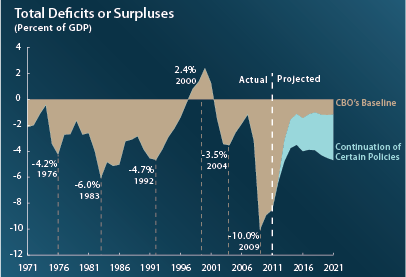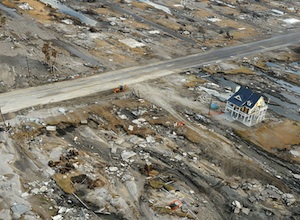Mr. Schock I did have a few questions
First let's separate the concepts we need to discuss: one, the debt, a total of accumulated deficits (the past), two, the deficit, a shortfall of revenue to expenditures in a fiscal year (the current), and three, assets and obligations (the future). Consider this first chart: hot off the Congressional Budget Office's web site.
When was there a surplus not a deficit? Clinton Administration, what was the tax rate?
Budget: the decisions made that affect the debt, surplus, deficit, and the future. The economy is a separate animal from the budget. Trade imbalance, unemployment, inflation or deflation all are apart of the discussion, but sound decisions can be made without considering every influence. We can model the weather, make predictions, argue about climate change, the cause of climate change, or if we want to build a beach house in Gilchrist, Texas make it to withstand a category 5 hurricane.
Click to watch you tube of News Report
It would be better if everyone was rational, but humans are not. This is why the old "invisible hand of the market" sometimes acts like a drunken college freshman. We need to very moderately and deliberately make some solid budget decisions that recognize we may not know everything, but we can design a sound and durable future. There were cheaper ways to build a beach house than the Adams' built in Gilchrist that withstood a hurricane. Having to walk up many stairs to a house built on piers can be inconvenient, but when the storm came, only one was left standing. We have to approach our fiscal issues in a balanced and measured way. We must include a sense of shared sacrifice. Many of those who came to the town hall believe foreign aid is a major part of the budget. We give 35 billion in economic aid, 2.6 billion to Afghanistan and 3 billion to Israel, others less. (explanatory link) Still our annual economic aid is less than the amount we lost to fraud in Iraq and Afghanistan. (explanatory link) Our decisions can not be made on the basis of talk show bluster, but on real numbers.





